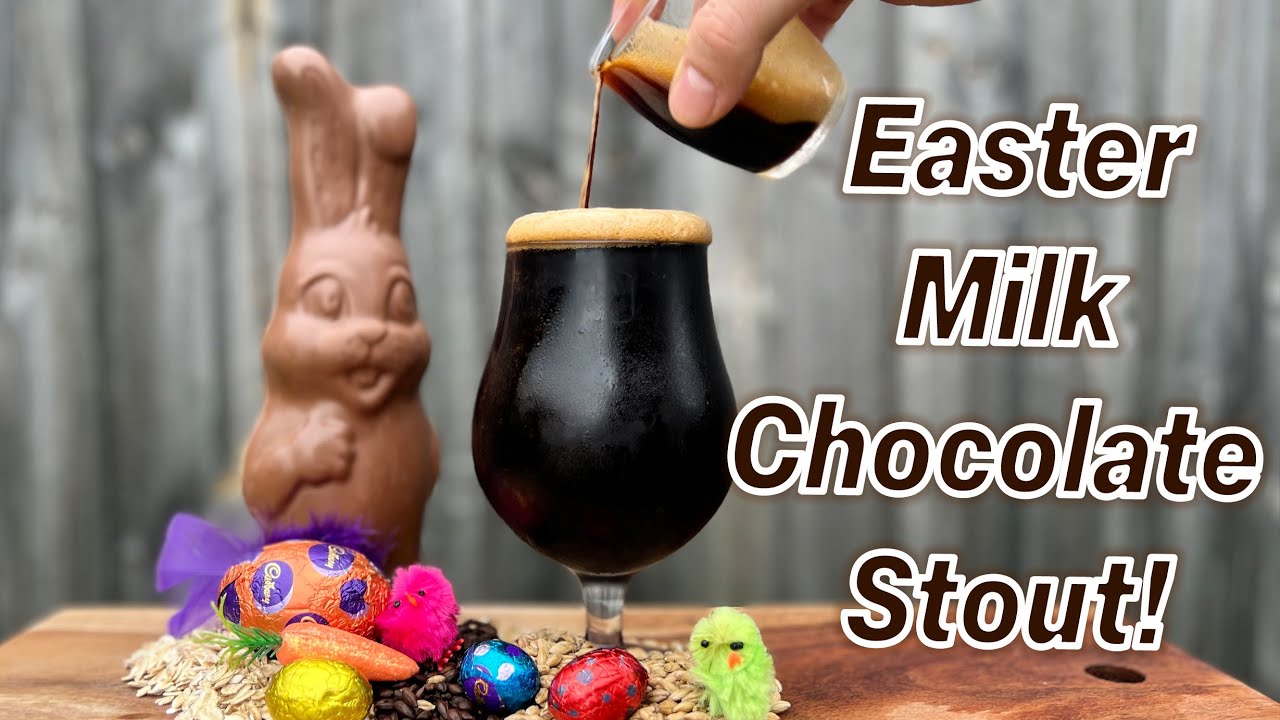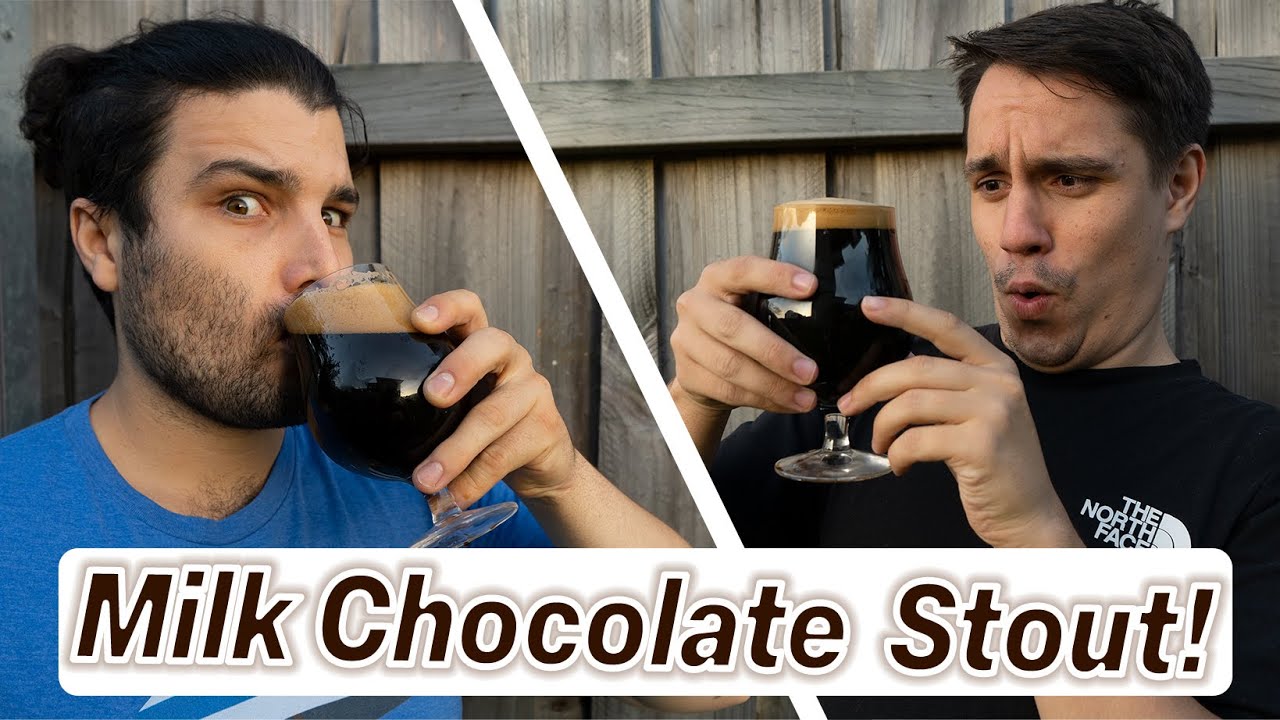Easter Milk Chocolate Stout

So... What is it?
The Milk Chocolate Stout is a dark, creamy and rich full-bodied black beer, overflowing with roasted espresso and dark chocolate-like flavours. The sweet silky body is owed not just to the wheat and oats often used in the grain bill, but also lactose which is added to provide unfermentable milk-based sugars. Typically these beers range from 4-6% ABV with a few leaning into the boozy above 7% side of the spectrum, and have a high final gravity, which is why they remain so thick, creamy, and luxurious!
What's our like?
Our Easter-themed version of the big black stout comes in at a hefty 7.2% so sip slowly, don't chug! The mouthfeel is creamy, silky, and luxuriously thick, the bitterness very subdued, and thanks to the huge additions of REAL milk chocolate, cacao nibs, lactose, and vanilla extract this stout exudes massive flavours and aromas of rich dark chocolate, freshly baked pastries, and just enough sweet malty character to keep it all in balance! So enjoy this bad boy in the depths of winter and feel snug as a bug in a rug as the rich boozy choccy milk stout warms you from the inside out!
Batch Size & Stats
- 42L / 11 gal finished beer
- 48L (12.6 gal) wort
- Starting gravity – 1.077
- Final gravity 1.024
- ABV – 7%
What ingredients?
Water
With sparging
- 90 minutes, 30L (7.9 gal) strike water 69°C (156.2°F) mash
- 34L (9 gal) sparge water at 78°C (172°F)
Without sparging
- 90 minutes, 65L (17.2 gal) strike water 69°C (156.2°F) mash
Malts
Total Grain Bill 12kg (15.4lb)
- Light Munich – 7.2kg (15.9 lb) - 60%
- Wheat malt – 1.3kg (2.8 lb) - 10.8%
- Rolled Oats - 1.2kg (2.6 lb) - 10%
- Eclipse Midnight Wheat - 1kg (2.2 lb) - 8.5%
- Medium Crystal Malt - 720g (1.58 lb) - 6%
- Dark Chocolate Malt - 580g (1.27 lb) - 5%
- Rice Hulls – 1kg (2.2 lb)
Adjuncts (A LOT!)
- 2.2kg (4.8 lb) of milk chocolate (added last 10 mins of boil)
- 250g (0.55 lb) Lactose (added last 15 mins of boil)
- 500g (1.1 lb) cacao nibs oven-toasted at 180°C (356°F) for 7 minutes and added to last 10 mins of boil
- 500g (1.1 lb) cacao nibs oven-toasted at 180°C (356°F) for 7 minutes and soaked in 700ml of vodka for a week then added to the fermenter at the end of fermentation
- 60ml (2 oz) Vanilla extract - added to the fermenter at the end of fermentation
Hops & whirlfloc tablets
Northern Brewer
15g (0.52 oz) - 60 minutes left in the boil
- 50g (1.76 oz) 15 minutes left in the boil
Fuggles
- 50g (1.76 oz) 15 minutes left in the boil
Whirlfloc
- 1.5g granulated or 2 tablets – 15 minutes left in the boil
Yeast options & fermentation temperatures
- US-05 – ferment at 20°C (68°F) 23g (0.81 oz) / (2 packets)
- AUS-05 – ferment at 20°C (68°F) 23g (0.81 oz) / (2 packets)
- S-04 – ferment at 18°C (64.4°F) 22g (0.81 oz) / (2 packets)

Step by step process
Step 1 – Milling
- Mill grains to medium crush (set mill rollers to a gap of approx. 1.00mm / 0.039 inches (credit card width)
- Just keep in mind roller gap settings are not universal so as you brew more batches you will find the ideal crush size for your setup
- Alternatively if you don’t have a grain mill you can order your grains crushed from most homebrew stores, both online and in person
Step 2 – Mashing
Mash for 90 minutes at 69°C (156.2°F)
- Set your strike water to a few degrees above the target mash temperature (you can use the calculator in our website for this)
- ensure you mix in the grains thoroughly with a mash paddle to prevent dough balls from forming (big spoons, spatulas or whisks will also work)
- its easier to mash the grains and prevent dough balls if you add a little grain at a time, mix, add more grain and repeat until all the grains are mixed
if you don’t have a mash tun with heating then ensure after you have finished mixing the grains in to insulate your mash tun (thick neoprene or heavy blankets both work well)
Step 3 (optional) – Sparging
- if your setup has the capability to sparge then do so with 35L (9.2 gal) sparge water at 78°C (172°F)
- if you are not sparging and using a BIAB (brew in a bag) method then remove grains from mash tun and twist and squeeze the bag to get as much liquid out of the grains as possible
- as you start sparging (or straining your BIAB bag) begin raising the temperature of your wort to a boil
Step 4 – Boiling
- once your wort begins to boil start a timer for a 60-minute boil and add your bittering hops, 15g (0.52 oz) of Northern Brewer
- at 15 minutes left in the boil add 2 whirlfloc tablets (OR granulated whirlfloc 1.5g (0.053 oz)), 250g (0.55 lb) Lactose and 50g (1.76 oz) each of Northern Brewer & Fuggles
- at 10 minutes left in the boil add 2.2kg (4.8 lb) of milk chocolate and 500g (1.1 lb) of oven-toasted cacao nibs
Step 5 – Whirlpooling / cooling
- once wort has been boiling for 60 minutes in total turn off your heat source and begin chilling wort down to yeast pitching temperature
- once you’ve reached yeast pitching temperature take an original gravity reading of your wort
Step 6 – Yeast Pitching
- It is best to make a yeast starter before beginning your brew day (ideally 1 day before) to ensure your yeast are as active and healthy as possible before pitching, but not completely necessary – you could also just rehydrate yeast 30 minutes before pitching.
- Wort Aeration (Optional) if you have a paint mixer give your wort a quick blitz before pitching yeast to help add more dissolved oxygen into the wort to help the yeast have a healthier kick start into fermentation
- Now add your tincture of Vanilla extract! (or you can wait till end of fermentation if you prefer)
- Pitch yeast in wort a degree or two higher than the target fermentation temperature to help yeast take off more aggressively
To make a yeast starter you can use either:
- DME (dry malt extract) at a ratio of approx. 100g per 1L water (3.5 oz per 33 fluid ounces) for gravity of approx. 1.040
- some unfermented wort kept cold and sanitary from a previous brew day
- 70g of table sugar per 1L water (2.5 oz per 33 fluid ounces) – however, it is best to use malt sugar (wort / DME) whenever possible to reduce the chance of shocking the yeast with a different food source from starter to wort pitching
To rehydrate yeast
- Add yeast to approx. 10 times as much room temperature water as the weight of the yeast e.g. 10g yeast in 100 ml water (0.35 oz yeast in 3.5 fluid ounces water)
Step 7 – Fermentation
- Allow yeast to ferment over the next two weeks (approx.)
- If you have a temperature-controlled system keep the fermenter temperature to the recommended fermentation temperature for each yeast strain (stated in the yeast ingredients section above)
- Monitor the fermentation activity over the first 7-10 days by the bubbling of the blow-off tube/airlock of your fermenter, as the bubbling slows down (roughly around day 10-12) take a gravity reading. When the gravity reaches around 1.026 raise the temperature of your fermenter by 1-2 degrees for 2 days for a diacetyl rest (if you don’t have temperature control don’t worry about this step, it's not the end of the world!)
- At the same time as starting diacetyl rest you can now add the 60ml (2 oz) of Vanilla extract and strain and add the cacao-infused vodka to the fermenter
- On day 2 of the diacetyl rest (once gravity reaches roughly 1.024) & gravity is the same 3 days in a row move onto cold crashing! (If you can’t / don’t want to cold crash go straight to kegging/bottling your beer!)
Step 8 (optional) – Cold crashing
- begin cold crashing your fermenter (bring the temperature of your fermenter down to as close to 0°C (32°F) as possible, for 2 days to a week depending on how patient you are
- If you don’t have a temp-controlled fermenter, you can cold crash by putting your fermenter in a fridge or temp-controlled chest freezer
- After you have finished cold crashing it's time to keg/bottle your beer! If you are bottling your beer from the fermenter uncarbonated, remember to add about 5-7 grams (0.17 - 0.24 oz) of priming sugar to your bottles to carbonate your beer.


